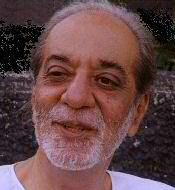Dichter
Adil Jussawalla

Adil Jussawalla
(India, 1940)
Biografie
Poet and critic Adil Jussawalla is an influential presence in Indian poetry in English. He has written two books of poetry, Land’s End (1962) and Missing Person (1976), edited a seminal anthology of new writing from India (1974) and co-edited an anthology of Indian prose in English (1977). He writes a complex poetry – ironic, fragmented, non-linear, formally strenuous – that evokes and indicts a dehumanised, spiritually sterile landscape, ravaged by contradiction, suspended in a perpetual state of catastrophe.
Jussawalla’s highly acclaimed first book, Land’s End, written almost entirely in England and Europe, was published when he was twenty-two. It was hailed by a critic as a book that captured “the artificiality and vulgarity of this age, the paradoxical nature of our emotions and desires, the unbridgeable gulf between ‘you’ and ‘I’, between dream and reality and the beauty and ugliness of love.” In the poetry of Jussawalla, we no longer find the Janus-faced postcolonial impulse of looking to the past to reaffirm the present. The poetry is born instead of a decision to look the present unflinchingly in the face, in all its disfigured and fractured reality. There is no attempt to escape “the various ways of dying that are home”, no resort to a visionary romanticism nor a nostalgic recreation of a more innocent history.
The irony grows darker and is accompanied by a discernible political consciousness (Marxist-Fanonite in inspiration) in the second book, Missing Person, written after his return to India. While a morally compromised, hollow and absurd world is acknowledged, the self is also implicated in the failed quest for meaning. “If one tried literally to represent the different elements of world culture of which one’s mind is made, one would write a language no one would understand. I have tried to suggest this chaos in Missing Person,” says Jussawalla.
But also implicit in this evocation of chaos is a trenchant critique of the underlying market-driven ethic of the bourgeoisie – a class that “can only torment itself with its own contradictions or turn on itself in a fury of self-destruction”. As critic Sudesh Mishra puts it: “For Jussawalla, the ironic emphasis on the marginal and the ‘non-human’ is perhaps a way of saying that the processes involved in the dehumanisation of art may well, in the future, contribute to the rehumanisation of man.”
Jussawalla’s is not an immediately accessible poetry, nor does it aspire to be. When asked in an interview by Peter Nazareth in 1978 about the peril of being incomprehensible, Jussawalla responded, “Well, I think the situation of the poet in India is such that being misunderstood is part of his function.”
In the same interview, Jussawalla was asked about the responsibility of the writer in times of crisis. “I don’t know,” he replied. “I think each writer will deal with the crisis in his own way . . . Maybe I see writing as an activity, at least for me personally, as linked up with a whole life, a whole sense of time. Indian writers do have a different sense of time in relation to their own work than the writers in the States, in England and in France, which means that we are bound to have a different attitude even to crisis . . . Am I being fatalistic if I say that for Indians, the crisis is perpetual?”
The poems in this edition are selections from Jussawalla’s two books as well as his more recent work. Also included here are excerpts from a presentation by poet and musician Anand Thakore on Jussawalla’s work.
© Arundhathi Subramaniam
Also on this site{id="2690" title="On the Music of ‘A Missing Person’: Adil Jussawalla and the Craft of Despair"}
Excerpts from a presentation by Anand Thakore.
Bibliography
Poetry:
Land’s End . Writers Workshop, Kolkata, 1962.
Missing Person. Clearing House, Mumbai, 1976.
Anthologies:
New Writing in India. Penguin, Harmondsworth, 1974.
Statements . Ed. with Eunice de Souza, Orient Longman, Mumbai, 1977.
Websites featuring Jussawalla
The Book and the Computer
‘A Goddess in the Works: The Devanagari Script and the Internet’: An article by Adil Jussawalla exploring the future of the printed word in the digital age
The Week
‘Literature: Living on the Fringes’; Article by Debashish Mukerji about the state of Indian poetry in English, incorporating Jussawalla’s views, in The Week (June 29, 2003)
Varnamala: Indian English Poetry
Some poems by Jussawalla
Deccan Herald
‘Week of Mars’; Literary Line column by Jussawalla in Deccan Herald(September 7, 2003)
Deccan Herald
‘Big novel, shrinking universe’; Literary Line article by Jussawalla in Deccan Herald (April 11, 2004)
The Tribune
‘Rice, ritual and satire’; Sunday Reading article by Jussawalla in The Tribune (January 17, 1999)
Gedichten
Gedichten van Adil Jussawalla
Sponsors















